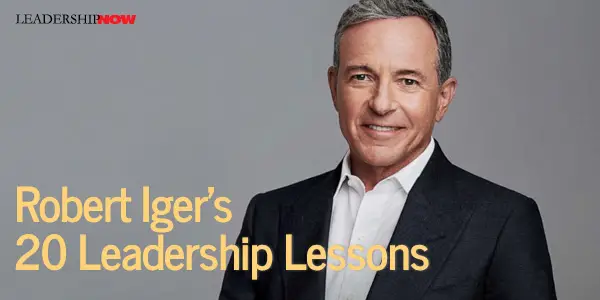Robert Iger's 20 Leadership Lessons

ROBERT IGER has worked for the same company for forty-five years: twenty-two of them at ABC, and another twenty-three at Disney, after Disney acquired ABC in 1995—the last fourteen of those years, as the CEO of Disney. He shares it all in The Ride of a Lifetime. Like the biggest, most exciting rides were once called at Disneyland, he says his time as CEO of Disney has been like a fourteen-year ride on a giant E-Ticket attraction.
After sharing a bit of his background, he quickly delves into his career beginning at ABC, and the lessons he’s learned and the principles that have guided him that help “nurture the good and manage the bad.”
He explains the thinking behind his habit of waking at 4:15 am.
It’s vital to create space in each day to let your thoughts wander beyond your immediate job responsibilities, to turn things over in your mind in a less pressured, more creative way than is possible once the daily triage kicks in. I am certain I’d be less productive and less creative in my work if I didn’t also spend those first hours away from the emails and text messages and phone calls that require so much attention as the day goes on.
Iger writes of the key mentors in his career and his relationship with Steve Jobs, George Lucas, and Michael Eisner. Iger truly embraces innovation. When he took over as CEO in 2005, he laid out three strategic priorities saying it should be about the future, not the past: Recommit to the concept that quality matters, embrace technology instead of fighting it, and think bigger—think global—and turn Disney into a stronger brand in international markets.
These priorities have guided the company through all of the growth and acquisitions since he was named CEO. Today, Disney is the largest media company in the world, counting Pixar, Marvel, Lucasfilm, and 21st Century Fox among its properties. Its value is nearly five times what it was when Iger took over.
You have to approach your work and life with a sense of genuine humility. The success I’ve enjoyed has been due in part to my own efforts, but it’s also been due to so much beyond me, the effort and support and examples of so many people, and to twists of fate beyond my control.
What follows are 20 leadership lessons from the book but stripped of the stories that brought them to life. You’ll have to read the book to get that.
1
I talk a lot about “the relentless pursuit of perfection.” In practice, this can mean a lot of things, and it’s hard to define. It’s a mindset, more than a specific set of rules. It’s not about perfectionism at all costs. It’s about creating an environment in which people refuse to accept mediocrity. It’s about pushing back against the urge to say that “good enough” is good enough.
2
Be decent to people. Treat everyone with fairness and empathy. This doesn’t mean that you lower your expectations or convey the message that mistakes don’t matter. It means that you create an environment where people know you’ll hear them out, that you’re emotionally consistent and fair-minded, and that they’ll be given second choices for honest mistakes. Excellence and fairness don’t have to be mutually exclusive. Strive for perfection but always be aware of the pitfalls of caring only about the product and never the people.
3
True integrity—a sense of knowing who you are and being guided by your own clear sense of right and wrong—is a kind of secret weapon.
4
Value ability more than experience, and put people in roles that require more of them than they know they have in them.
5
Do not fake anything. You have to be humble, and you can’t pretend to be someone you’re not or to know something you don’t. True authority and true leadership come from knowing who you are and not pretending to be anything else.
6
Don’t start negatively and don’t start small. People will often focus on little details as a way of masking a lack of any clear, coherent, big thoughts. If you start petty, you seem petty.
7
Don’t let ambition get ahead of opportunity. By fixating on a future job or project, you become impatient with where you are. You don’t tend enough to the responsibilities you do have, and so ambition can become counterproductive. It’s important to know how to find the balance—do the job you have well; be patient; look for opportunities to pitch in and expand and grow; and make yourself one of the people, through attitude and energy and focus, whom your bosses feel they have to turn to when an opportunity arises.
8
My former boss Dan Burke [ABC] once handed me a note that said: “Avoid getting into the business of manufacturing trombone oil. You may become the greatest trombone-oil manufacturer in the world, but in the end, the world only consumes a few quarts of oil a year!” He was telling me not to invest in small projects that would sap my and the company’s resources and not give much back. I still have that note in my desk, and I use it when talking to our executives about what to pursue and where to put their energy.
9
We all want to believe we’re indispensable. You have to be self-aware enough that you don’t cling to the notion that you are the only person who can do this job. At its essence, good leadership isn’t about being indispensable; it’s about helping others be prepared to step into your shoes—giving them access to your own decision-making, identifying the skills they need to develop and helping them improve, and sometimes being honest with them about why they’re not ready for the next step up.
10
Too often, we lead from a place of fear rather than courage, stubbornly trying to build a bulwark to protect old models that can’t possibly survive the sea change that is underway. It’s hard to look at your current models, sometimes even ones that are profitable in the moment, and make a decision to undermine them in order to face the change that’s coming.
11
Optimism emerges from faith in yourself and in the people who work for you. It’s not about saying things are good when they’re not, and it’s not about conveying some blind faith that “things will work out.” It’s about believing in your and others’ abilities.
12
People sometimes shy away from big swings because they build a case against trying something before they even step up to the plate. Long shots aren’t usually as long as they seem. With enough thoughtfulness and commitment, the boldest ideas can be executed.
13
You have to convey your priorities clearly and repeatedly. If you don’t articulate your priorities clearly, then the people around you don’t know what their own should be. Time and energy and capital get wasted.
14
You can do a lot for the morale of the people around you (and therefore the people around them) just by taking the guesswork out of their day-to-day life. A lot of work is complex and requires intense amounts of focus and energy, but this kind of messaging is fairly simple: This is where we want to be. This is how we’re going to get there.
15
It’s easy to be optimistic when everyone is telling you you’re great. It’s much harder, and much more necessary, when your sense of yourself is on the line.
16
As a leader, you are the embodiment of that company. What that means is this: Your values—your sense of integrity and decency and honesty, the way you comport yourself in the world—are a stand-in for the values of the company. You can be the head of a seven-person organization or a quarter-million-person organization, and the same truth holds: what people think of you is what they think of your company.
17
Projecting your anxiety onto your team is counterproductive. It’s subtle, but heirs a difference between communicating that you share their stress—that you’re in it with them—and communicating that you need them to deliver in order to alleviate your stress.
18
The decision to disrupt a business model that is working for you requires no small amount of courage. It means intentionally taking on short-term losses in the hope that a long-term risk will pay off. Routines and priorities get disrupted. Traditional ways of doing business get slowly marginalized and eroded—and start to lose money—as a new model takes over. That’s a big ask, in terms of a company’s culture and mindset. When you do it, you’re saying to people who for their entire careers have been compensated based on the success of their traditional business: “Don’t worry about that too much anymore. Worry about this instead.” But this isn’t profitable yet, and won’t be for a while. Deal with this kind of uncertainty by going back to basics: Lay out your strategic priorities clearly. Remain optimistic in the face of the unknown. And be accessible and fair-minded to people whose work lives are being thrown into disarray.
19
It’s not good to have power for too long. You don’t realize the way your voice seems to boom louder than every other voice in the room. You get used to people withholding their opinions until they hear what you have to say. People are afraid to bring ideas to you, afraid to dissent, afraid to engage. This can happen even to the most well-intentioned leaders. You have to work consciously and actively to fend off its corrosive effects.
20
Hold on to your awareness of yourself, even as the world tells you how important and powerful you are. The moment you start to believe it all too much, the moment you look at yourself in the mirror and see a title emblazoned on your forehead, you’ve lost your way.

* * *

Like us on
Instagram and
Facebook for additional leadership and personal development ideas.
* * *




Posted by Michael McKinney at 10:39 AM
Permalink
| Comments (0)
| This post is about Entrepreneurship
, Leaders










